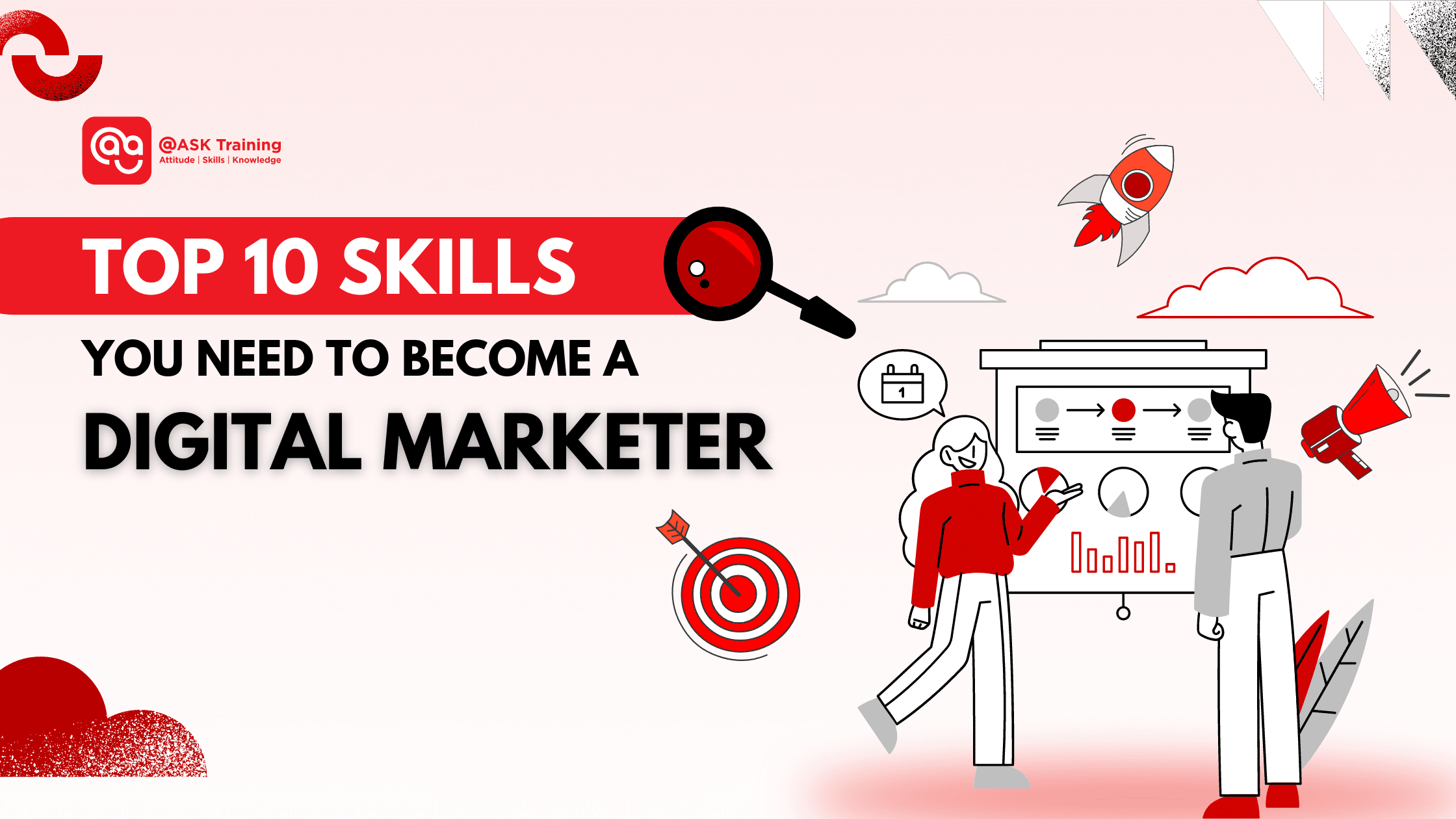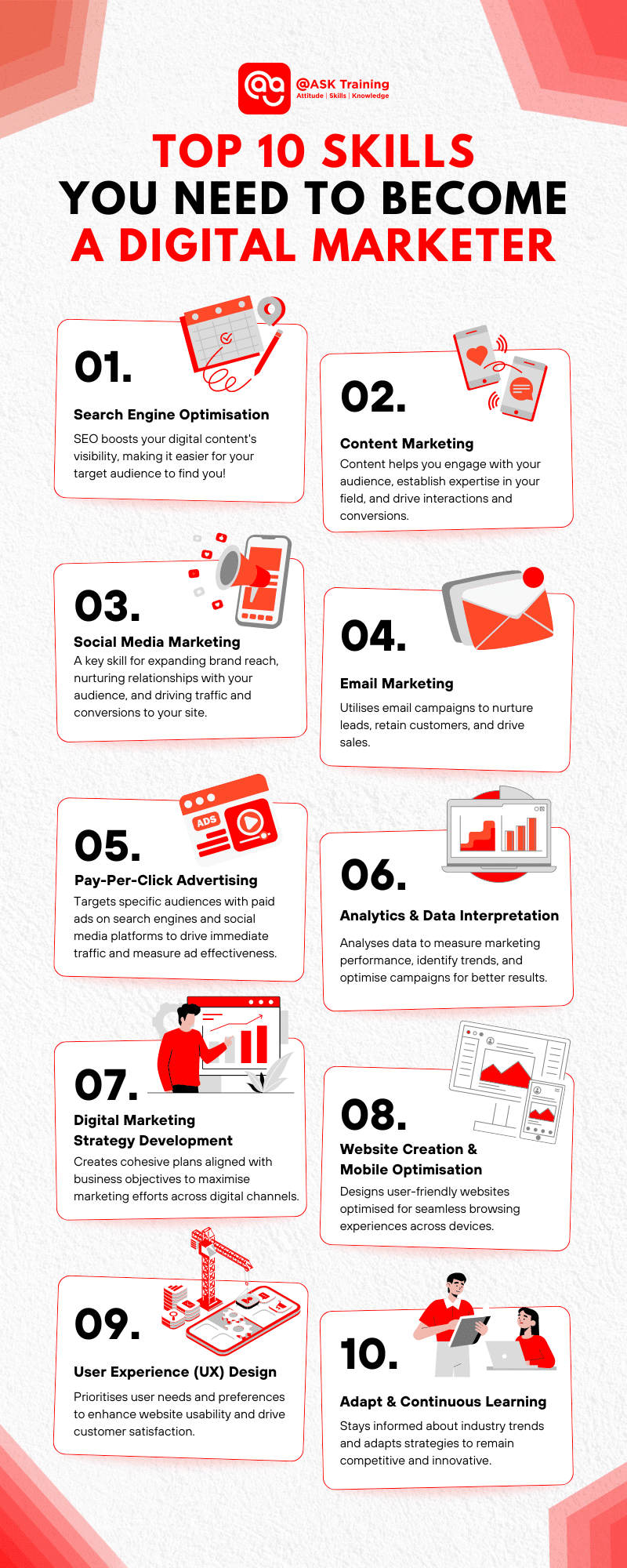
Do you know that Singapore has one of the highest internet penetration rates in the world, with over 84% of the population being active internet users?
Moreover, the e-commerce market in Singapore is getting bigger every year. Experts predict that it will keep growing at a steady pace, increasing by about 9.47% every year from 2023 to 2027.
So, why does this matter? It means there are loads of opportunities in the digital world, especially for anyone interested in digital marketing!
As the digital world keeps growing and getting busier, there’s a big need for people who know how to market stuff online. And that’s where you come in!
But where do you start? Well, don’t worry! We’re here to guide you through it.
From search engine optimisation (SEO) to social media marketing and website creation, we’ll introduce you to the top 10 skills you need to become a digital marketing pro in Singapore.
Let’s get into it!
#1: Search Engine Optimisation (SEO)

Imagine you’re searching for something online, like a new pair of shoes or a dinner recipe. You type your query into a search engine like Google, and within seconds, you’re presented with a list of websites that match what you’re looking for.
But have you ever wondered why some websites show up at the top of the list while others are buried on page five or six?
That’s where SEO comes in! SEO stands for Search Engine Optimisation, and it’s about making your website more visible to people who are searching for things online. Think of it like trying to stand out in a crowded room – you want to make sure people notice you!
In Singapore itself, there are around 298 SEO agencies which reflects the growing demand for SEO as a skill.
So, if you want to become a Digital Marketer, learning SEO is crucial for several reasons:
Increased Website Visibility
SEO helps websites rank higher in search engine results pages (SERPs), making them more visible to potential customers. By optimising your website for relevant keywords and search queries, you can attract more organic traffic and increase your online visibility.
More Website Traffic
Studies have shown that websites ranking on the first page of Google receive the majority of clicks. By learning SEO techniques, you can improve your website’s ranking and drive more targeted traffic to your site, leading to increased brand exposure and potential customers.
Cost-Effective Marketing
Unlike paid advertising, which requires ongoing investment, SEO is a cost-effective marketing strategy that can deliver long-term results. Once your website ranks well for relevant keywords, you can continue to attract organic traffic without having to pay for each click or impression.
Builds Credibility and Trust
Websites that rank highly in search results are often perceived as more credible and trustworthy by users. By appearing at the top of search engine results, you can establish your brand as an authority in your industry and build trust with potential customers.
Competitive Advantage
In today’s competitive digital landscape, having strong SEO skills gives you a competitive advantage. By outranking your competitors in search results, you can attract more traffic and customers, ultimately leading to business growth and success.
So, whether you’re selling products, offering services, or just sharing your awesome content with the world, learning SEO is the secret sauce to getting noticed, driving traffic, and crushing it in the digital marketing game!
With SEO ensuring your content is easily discoverable by your target audience, let’s look at how Content Marketing can support your SEO efforts.
#2: Content Marketing
To become a digital marketer, learning content marketing skills is essential because it’s like the heartbeat of your digital strategy.
Content marketing is creating and sharing valuable, relevant content to attract and engage your target audience.
Imagine you’re scrolling through social media and come across a blog post or a video that teaches you something new or entertains you. That’s content marketing in action!
Here’s why it’s important for your digital marketing career:
Establish Brand Authority
By sharing helpful content, you establish yourself or your brand as an authority in your industry. When people find your content useful, they’re more likely to trust you and seek out your products or services.
Drives Traffic and Leads
Great content can attract lots of eyeballs to your website or social media profiles. Whether it’s through blog posts, videos, or social media updates, engaging content can lead to more website visitors and potential customers.
Boosts Engagement and Loyalty
Content marketing isn’t just about getting people’s attention—it’s about keeping it. By consistently delivering valuable content, you can keep your audience engaged and build long-term relationships with them.
Supports Your SEO Efforts
Search engines love fresh, high-quality content. By regularly publishing content that’s optimised for relevant keywords, you can improve your website’s visibility in search engine results, attracting even more traffic.
So, whether you’re creating blog posts, videos, podcasts, or social media updates, learning content marketing as a skill can boost your digital marketing career by helping you attract, engage, and convert your audience effectively.
From acquiring the skills to create content, social media marketing is the next skill you need to help your content shine to the right people!
#3: Social Media Marketing
Next, learning social media marketing skills is a no-brainer when it comes to getting a career in digital marketing. This is because social media marketing is like having a direct line to your audience.
Social media marketing is using social media platforms like Facebook, Instagram, TikTok, and LinkedIn to connect with your audience, build your brand, and drive business results.
It’s like throwing a party and inviting all your friends – except your friends are potential customers!
Here in Singapore, more than half of people (52.6%) who go online like to check out brands, products, and services before buying them. This shows how important it is for brands to have a strong presence on social media!
Here’s why it’s an important skill to have if you want to become a digital marketer:
Connects You with Your Audience
Social media platforms are where people spend a lot of their time online. By being active on social media, you can connect with your audience where they already hang out, making it easier to engage with them and build relationships.
Let’s say that if you’re selling skincare products, posting skincare tips and tutorials on Instagram can help you connect with beauty enthusiasts and potential customers.
Increases Brand Awareness
Social media is a powerful tool for getting your brand in front of a larger audience. By sharing engaging content and interacting with your followers, you can increase brand visibility and attract new customers.
For example, running a Facebook ad campaign targeting users interested in fitness can help a gym attract new members and increase brand awareness.
Drives Website Traffic and Conversions
Social media isn’t just about likes and shares – it can also drive real business results. By sharing links to your website and promoting your products or services on social media, you can drive traffic to your site and generate leads and sales.
Such as sharing a link to a blog post on Twitter can drive traffic to your website, where visitors might sign up for your email list or make a purchase.
Provides Valuable Insights
Social media platforms offer analytics tools that provide valuable insights into your audience’s demographics, interests, and behaviours. By analysing this data, you can better understand your audience and tailor your marketing efforts to their preferences.
For example, analysing engagement metrics on Instagram can help a fashion brand understand which types of posts resonate most with their audience, allowing them to create more of the same content that performs well.
Learning social media marketing as a skill can significantly boost your digital marketing career. By effectively applying this skill, you position yourself as a valuable asset in the competitive digital landscape.
As the field continues to evolve, your proficiency in social media marketing can pave the way for higher-level positions with increased responsibilities and rewards!
Is social media marketing enough to increase a brand’s visibility? The more the better. Let’s take a look at one of the oldest yet valuable skill to master, email marketing.
#4: Email Marketing
Email marketing is a fundamental skill in digital marketing and is crucial for a career in this field.
Email marketing involves sending targeted emails to your subscribers to build relationships, promote products or services, and drive conversions. It’s like sending personalised letters to your friends but in the digital world!
A few reasons why email marketing is another in-demand skill as a digital marketer:
Direct Communication
Email marketing allows you to reach your audience directly in their inbox. Unlike social media or search engine marketing, where you’re at the mercy of algorithms, email marketing gives you full control over your message and its delivery.
For example, sending a weekly newsletter to your subscribers with updates, tips, and promotions keeps them engaged and informed about your brand.
Personalisation
With email marketing, you can personalise your messages based on your subscribers’ interests, behaviours, and demographics. This personal touch helps you connect with your audience on a deeper level and increases the likelihood of engagement and conversions.
A good example is addressing subscribers by their first name and sending them tailored content based on their past purchases or website activity. This shows that you understand their needs and preferences.
Automation and Scalability
Email marketing platforms offer automation features that allow you to set up email campaigns in advance and deliver them automatically based on triggers or schedules. This scalability makes it easy to reach thousands of subscribers with personalised messages without manual effort.
For example, setting up a welcome email series that automatically sends a sequence of emails to new subscribers, introducing them to your brand and guiding them through the onboarding process.
Measurable Results
Email marketing provides valuable insights into your campaign performance, allowing you to track metrics like open rates, click-through rates, and conversion rates.
This data helps you understand what resonates with your audience and optimise your future campaigns for better results.
You will learn how to analyse the performance of different subject lines or email designs to help you identify which elements drive the highest engagement and adjust your strategies accordingly.
Therefore, email marketing as a skill equips you with a powerful tool for engaging with your audience and driving business results. It also enhances your marketability and effectiveness as a digital marketer in today’s competitive landscape.
Now that we’ve covered the importance of email marketing, let’s dive into another essential skill: Pay-Per-Click (PPC) Advertising.
#5: Pay-Per-Click (PPC) Advertising
PPC advertising involves placing ads on search engines or social media platforms and paying a fee each time a user clicks on the ad.
In Singapore, digital ad spending increased by 10.5% in 2023, hitting SG$2.34 billion. A significant portion, about 24.5%, was spent on social media advertising. This further proves how in-demand this skill is to become a digital marketer.
So, why is understanding PPC advertising crucial for your digital marketing journey? Let’s find out:
Targeted Advertising
PPC platforms like Google Ads and Facebook Ads offer advanced targeting options that allow you to reach specific demographics, interests, and behaviours.
By learning PPC advertising, you can create highly targeted campaigns that reach the right audience at the right time, increasing the likelihood of conversions.
For example, you can create highly targeted ads that appear to users in Singapore searching for terms like “digital marketing courses near me” on Google. This targeted approach ensures that your ads reach individuals who are actively seeking those services.
Immediate Results
Unlike organic methods like SEO, which can take time to see results, PPC advertising offers immediate visibility and traffic.
With PPC, you can launch campaigns and start driving traffic to your website or landing page almost instantly, making it an effective strategy for generating quick results and leads.
Imagine you’re launching a new product line for your online fashion boutique. Instead of waiting for SEO efforts to boost your website’s organic visibility, you decide to launch a PPC campaign on Facebook targeting users interested in fashion and shopping.
Within hours of launching the campaign, you start driving traffic to your website and generating sales, providing immediate results and a quick return on investment.
Measurable ROI
PPC advertising provides detailed analytics and reporting tools that allow you to track the performance of your campaigns in real-time.
You can monitor key metrics such as click-through rates, conversion rates, and return on investment (ROI), enabling you to optimise your campaigns for better results and demonstrate ROI to clients or stakeholders.
Suppose you’re managing PPC campaigns for a client who owns a travel agency in Singapore. By utilising Google Ads, you set up conversion tracking to monitor the number of users who book travel packages through the website after clicking on the ad.
With detailed analytics and reporting, you can calculate the ROI of the PPC campaigns, demonstrating the effectiveness of your advertising efforts to the client.
Budget Control
PPC advertising gives you full control over your budget and spending. You can set daily or monthly budgets, adjust bids for keywords or audience targeting, and pause or stop campaigns at any time.
This flexibility allows you to allocate your budget effectively and maximise the impact of your advertising dollars.
Let’s say you’re promoting a limited-time offer for a local restaurant chain through PPC advertising on Instagram.
With Instagram Ads, you set a daily budget and bid strategy to ensure that your ads are displayed to users within a specific geographical location and demographic profile.
Throughout the campaign, you closely monitor spending and adjust bids to stay within the allocated budget while maximising exposure and engagement.
Competitive Advantage
In today’s competitive digital landscape, PPC advertising can give you a competitive edge by allowing you to outbid competitors for ad placements or target niche audiences that are difficult to reach through other channels.
By familiarising PPC advertising, you can stay ahead of the competition and achieve your marketing goals more efficiently.
Overall, learning PPC advertising equips new digital marketers like yourself with a valuable skill set that is highly sought after in the industry.
You can gain a competitive edge by outbidding competitors for ad placements, targeting niche audiences, and achieving higher visibility in search engine results.
After PPC advertising, how can you utilise the analytics and data performance? Let’s take a look through the next important skill which is Analytics and Data Interpretation.
#6: Analytics and Data Interpretation
Learning analytics and data interpretation is essential for anyone interested in becoming a digital marketer because it allows you to make informed decisions based on data-driven insights.
Analytics refers to the process of collecting, measuring, and analysing data to understand trends, patterns, and user behaviour, while data interpretation involves extracting meaningful insights from the data collected to make better decisions about our marketing strategies.
Let’s break down why understanding analytics and data interpretation is a skill you need:
Understanding Your Audience
Analytics tools, like Google Analytics, help you see who’s visiting your website and what they’re doing there.
By analysing this data, you’ll gain insights into where your audience comes from, what they’re interested in, and what they’re looking for. This helps us create content and ads that they’ll love.
Imagine you have a bakery website, and analytics tell you that most of your visitors come from social media. You might focus on sharing more delicious photos and recipes on platforms like Instagram and Facebook to attract even more visitors.
Measuring Success
Analytics also help us see how well our marketing efforts are working. It’s like having a scoreboard that tells us if we’re winning or losing.
We can track things like how many people visit our website, how many of them make a purchase, and how much money we make from our ads.
Using back the bakery website example, if you run an email campaign offering a discount on your bakery’s cupcakes, analytics will show you how many people opened the email and how many of them actually clicked through to buy cupcakes.
This helps you understand if the campaign was successful or if you need to try something different next time.
Improving the Experience
Analytics help us see where people might be getting stuck or confused on our website. It’s like having a map that shows us where the roadblocks are so we can fix them. By making our website easier to use, we can keep people happy and coming back for more.
If analytics show that many people are leaving your website on the checkout page without buying anything, you might investigate to see if there are any issues with the checkout process, like a complicated form or hidden fees. Fixing these issues can help increase sales.
Demonstrating ROI
Finally, analytics help us prove to others that our marketing efforts are paying off. By sharing the data and insights we gather, we can build trust and confidence in our marketing strategies.
For example, you can use analytics to show your boss how much website traffic and sales have increased since you started running ads on social media.
This helps them see the value of your work and might even lead to a promotion or raise!
Overall, learning analytics and data interpretation helps us understand our audience better, measure the success of our marketing efforts, improve the user experience, and prove the value of our work.
It’s an essential skill for any aspiring digital marketer and can make a big difference in your career success!
From learning how to interpret your analytics and data, the next important skill as a digital marketer would be to learn how to develop effective digital marketing strategies.
#7: Digital Marketing Strategy Development
If you’re eyeing a career in digital marketing, crafting a killer digital marketing strategy goes beyond just throwing ideas at the wall and hoping something sticks.
It’s about laying down a roadmap that guides every aspect of your online presence, ensuring that every move you make is purposeful and aligned with your goals.
From setting clear goals to choosing the right digital marketing channels, here’s why having this skill is crucial for you to become a digital marketer:
Setting Clear Goals and Objectives
Imagine you’re planning a road trip. Before you hit the road, you need to know where you’re going and why.
Similarly, in digital marketing, setting clear goals and objectives is like plotting your destination on a map. It helps you stay focused and know what success looks like for your marketing efforts.
For example, if you’re promoting a new product, your goal might be to increase sales by 20% within three months.
With this goal in mind, you can create a strategy focused on driving traffic to your product page and converting visitors into customers.
Audience Segmentation and Targeting
Just like how you wouldn’t invite everyone you know on your road trip, you need to target your marketing efforts to the right audience.
Audience segmentation involves dividing your target audience into smaller groups based on factors like demographics, interests, and behaviour. This makes it easier for you to create personalised messages that resonate with each group.
Let’s say that you’re marketing a skincare product, you might segment your audience into different groups based on age, skin type, and skincare concerns.
This allows you to tailor your messaging and product recommendations to each segment’s specific needs and preferences.
Choosing the Right Digital Marketing Channels
There are many different digital marketing channels available, like social media, email, search engines, and more.
Choosing the right channels for your strategy is like picking the best routes for your road trip. You want to use channels that reach your target audience effectively and align with your marketing goals.
If you’re targeting young adults, platforms like Instagram and TikTok might be more effective for reaching them compared to email or traditional advertising.
By choosing the right channels, you can maximise your reach and engagement with your target audience.
Creating Comprehensive Marketing Plans
Once you’ve set your goals, identified your audience, and chosen your channels, it’s time to put everything together into a comprehensive marketing plan!
Think of it as your roadmap for achieving your marketing objectives. Your plan should outline the strategies, tactics, timelines, and resources needed to execute your digital marketing campaigns successfully.
Your marketing plan might include details like the content calendar for your social media posts, the schedule for your email campaigns, and the budget allocation for your paid advertising efforts.
Having a detailed plan ensures that everyone on your team knows what needs to be done and when.
In essence, digital marketing strategy development is about creating a roadmap that guides your marketing efforts towards achieving your goals. By learning all the above, you can drive success for your business or clients in the ever-changing digital landscape.
After mastering how to develop effective digital marketing strategies, another in-demand skill in the digital marketing world is learning how to create websites and optimise them across all devices. Let’s explore further.
#8: Website Creation and Optimisation
Learning how to create websites and make them mobile-friendly is essential for anyone interested in becoming a digital marketer. But why is it so important? Well, having this skill allows you to build websites that attract and engage your target audience effectively.
So, why is knowing how to create a website a must-have skill for a digital marketer?
Creating Websites
Think of website creation as building a house for your business on the internet. It’s where people go to learn about what you offer and how they can get it.
With tools like WordPress and Wix, learning how to create websites becomes more accessible and manageable, even for beginners. With these platforms, you can ensure that your website looks great, functions seamlessly, and provides visitors with a user-friendly experience.
In Singapore, the estimated average cost of creating a website can vary depending on its complexity. For a basic one-page site, it can range from SG$1,500-2,000, while a fully customised solution may cost up to SG$20,000.
Understanding the cost of website creation showcases the demand for this skill whether you want to become a full-time or a freelancer in digital marketing.
Let’s say you’re starting a small business selling handmade jewellery in Singapore. With a website, you can showcase your beautiful creations, tell people your story, and even sell your jewellery online to customers all over the world!
Making it Mobile-Friendly
Now, imagine if your house could change its shape depending on who’s visiting – that’s what mobile optimisation is all about!
With so many people using phones and tablets to browse the internet, it’s important to make sure your website looks good and works well on smaller screens too.
If your jewellery website looks tiny and hard to read on a phone, people might get frustrated and leave. But if it’s mobile-friendly, they can easily see your stunning pieces and make a purchase, no matter where they are!
So, by learning how to create websites and make them mobile-friendly, you’re setting yourself up for success as a digital marketer.
You’ll be able to build awesome online homes for businesses, attract more visitors, and turn them into happy customers, all while making the internet a more user-friendly place!
Now that you know how to create a website, making sure your audience has a seamless experience when using it whether on desktop or mobile is just as important! User Experience (UX) Design is also a crucial skill for a digital marketer to have.
#9: User Experience (UX) Design
User Experience (UX) Design is making digital stuff easy and fun to use! It can be websites, apps, or software, UX Design aims to create interactions that feel smooth and enjoyable for the people using them.
Imagine you’re designing a game or an app for your friends to play with – you’d want it to be easy to figure out and fun to use, right? That’s what UX Design is all about!
To become a digital marketer, learning User Experience (UX) Design is important for several reasons:
Enhanced Customer Satisfaction
Think about when you use an app or visit a website, and everything just feels easy and enjoyable. That’s what we call a positive user experience!
When businesses understand how to make things easy and fun to use, it keeps customers happy and coming back for more.
By learning about UX design, you can create digital stuff that people love to use, which makes them super satisfied and loyal to your brand.
Increased Conversions
Imagine you’re shopping online and the website is super confusing or takes forever to load. Chances are, you’ll probably leave without buying anything, right?
But if a website is well-designed and easy to use, you’re more likely to stick around and make a purchase.
That’s why businesses care about UX design – because it helps them turn more visitors into customers, leading to more sales and leads.
Competitive Advantage
With so many businesses out there, it’s important to stand out from the competition. By focusing on creating amazing user experiences, you can make your brand shine brighter than the rest.
When people have a great experience using your website or app, they’re more likely to choose you over other brands, giving you a competitive edge in the digital world.
Better Insights and Decision-Making
Ever wonder why some websites or apps just seem to work better than others? It’s because they’ve been carefully designed based on how people use them.
By learning about UX design and doing things like talking to users and testing different designs, you can understand what your customers want and make smarter decisions to improve your digital marketing strategies, allowing you to create more targeted and effective campaigns.
Future-Proof Your Career
The digital world is always changing, but one thing that never goes out of style is making things easy and enjoyable to use.
By learning about UX design, you’re setting yourself up for success in the ever-evolving world of digital marketing. It’s a skill that businesses are always looking for, so you’ll be ready for whatever the future holds!
To ensure long-term success in your digital marketing career, adaptability and continuously learning are the secret skill anyone should have especially in an industry that changes all the time.
#10: Adaptability and Continuous Learning
Adaptability and continuous learning are your dependable companions as you navigate the dynamic world of digital marketing.
Think of them as your loyal allies, always by your side to help you overcome challenges and seize opportunities on your journey to becoming a successful digital marketer.
Here’s why they’re absolutely essential:
Stay Updated with Industry Trends
Digital marketing is like a thrilling adventure – and staying updated with industry trends is like having a treasure map! By keeping an eye on what’s happening in the digital world, you’ll always know where the golden opportunities are.
Plus, being in the loop helps you make smarter decisions and stand out in the crowded digital sphere!
Be Flexible with Changes in Algorithms and Tech
Anything can happen overnight in digital marketing. Being open to adjusting your strategies when algorithms or tech tools get an upgrade is like having a secret cheat code.
It keeps your campaigns fresh, effective, and ready to win big in this ever-changing digital playground!
Embrace Learning Opportunities
Hey, we all start somewhere, right? Taking the plunge into learning unlocks a whole new level in your digital marketing journey.
Dive into digital marketing courses or explore new techniques on your own, every bit of knowledge you gain is adding a shiny new tool to your digital marketing toolbox!
Singapore government offers plenty of help for individuals like you who are considering new careers! One example would be to enrol in a SkillsFuture Singapore-appointed Continuing Education Training Centre (CETC) such as @ASK Training!
With a range of government funding options and programmes accredited by the Workforce Skills Qualification (WSQ), transitioning into or beginning a career in digital marketing is both accessible and convenient.
Connect with Other Pros
Building connections with other professionals isn’t just about swapping business cards – it’s about joining a vibrant community where you can share ideas, get inspired, and level up your skills together.
So, grab a virtual coffee with a fellow marketer or join a fun online meetup – you never know what awesome opportunities might come your way!
To be adaptable and learn continuously are your greatest weapons yet. Embrace them wholeheartedly and let them guide you on your journey to becoming a digital marketing master!
Are You Up for Your Digital Marketing Journey?
Don’t forget that the journey into digital marketing is an exciting one that’s constantly evolving.
Let’s recap the top 10 important skills that you should focus on to become a successful digital marketer in Singapore:
With determination, curiosity, and a willingness to adapt, you’re well-equipped to embark on a fulfilling and rewarding career in digital marketing.
To become a skilled digital marketer, you’ll need to learn a combination of digital marketing skills. Don’t worry! From SEO to social media or email marketing, @ASK Training is here to help you achieve that, check out our website to explore all our digital marketing courses.
Plus, if you’re ready to kickstart your career in digital marketing, take advantage of our career support services when you complete your Diploma in Digital Marketing with us and we will help you find the perfect opportunity.
Let us be the ally to your digital success! Get in touch with us!
Related Courses
- WSQ Diploma in Digital Marketing
- WSQ Advanced Certificate in Digital Marketing
- WSQ Specialist Diploma in Digital Marketing
◆◆◆










